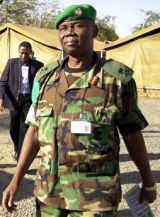African monitors suspend work in South Darfur
KHARTOUM, Dec 20 (Reuters) – African Union (AU) truce monitors have suspended operations in South Darfur state after an attack on an AU helicopter, an AU official said on Monday.

|
|
General Festus Okonkwo, AU commander in Darfur. (AP). |
“To my knowledge, this suspension is only in South Darfur state,” said a senior AU official, asked about a report that the observers had called off monitoring throughout the region. South Darfur state makes up about one third of the region.
The official, who asked not to be named, did not say how long the suspension was likely to last.
The AU official said earlier on Monday that an AU helicopter on its way to one area of recent conflict came under fire and was forced to return at around 4:45 p.m. (1345 GMT) on Sunday.
“The helicopter is OK. There are no injuries and gunshot holes were seen on the body of the helicopter,” he told Reuters.
AU officials said the attack was evidence that a ceasefire between the government and rebels in the Labado area was not holding, though it was not clear who fired at the helicopter.
“When there is some incident like this we have to stop and take a break to assess the situation… We might not be able to say whether fighting is still going on or not,” the official said.
Government troops and rebels had clashed in the Labado area, 65 km (40 miles) east of the state capital Nyala, after an original deadline to end hostilities passed on Saturday evening.
The AU has more than 800 ceasefire monitors in Darfur and has also been mediating in faltering peace talks in Nigeria between the Sudanese government and the rebels. Each side has regularly accused the other of violating an April ceasefire.
The AU had accused the government of failing to comply with a deadline to stop fighting in Darfur, citing helicopter strikes on a village in South Darfur on Saturday. It threatened to refer the fighting to the U.N. Security Council if it did not stop.
Rebels launched their uprising against the government last year, accusing Khartoum of neglecting the arid western region where tribal tensions have long simmered over scarce resources.
